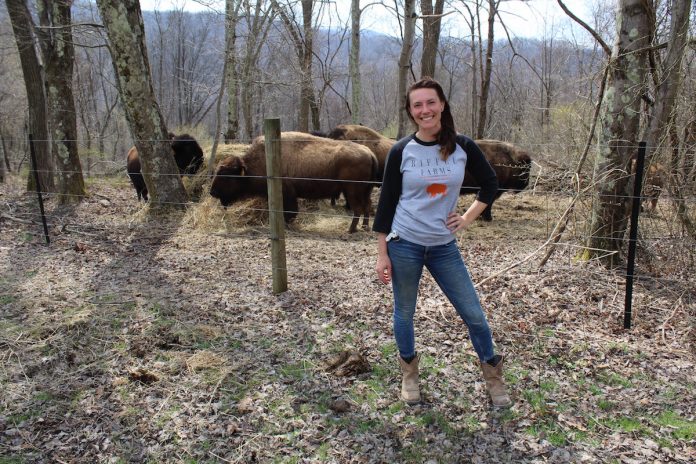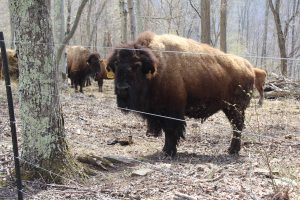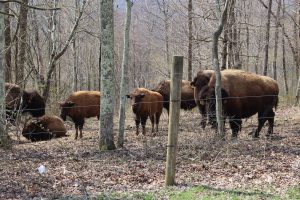
TERRA ALTA, W.Va. — Liz Riffle’s friends thought she was kind of crazy when she told them she was starting a bison farm in 2017. But for Liz and her husband, Jimmie, it made perfect sense that their first foray into farming would be raising the national mammal.
“Everybody else raises cattle,” she said. “We wanted to do something different.”
Riffle Farms is the only commercial bison farm in West Virginia. Raising American bison, as they’re formally called, seemed like a perfect combination for the Riffles’ interests and backgrounds.
The couple met in the U.S. Navy and are both trained in the healthcare field. Jimmie still works as a nurse practitioner in the Navy. Liz served as a nurse for six years before exiting the military in 2016.
For health conscious folks, bison is the red meat of choice for people looking to replace beef in their diet, Liz said. Bison has become known as a heart healthy meat because of its low saturated fat and cholesterol content.
They thought people would enjoy having locally-sourced bison meat. But raising buffalo provided a somewhat unexpected alternative source of income: agritourism.
“We knew having bison in West Virginia was going to be a heck of a niche in and of itself,” Liz said.
Getting started
The couple wanted to settle down in rural West Virginia when Jimmy retired from the military in a few years. He grew up in the area and wanted to raise a family there.
“One of the nice things about the military is when you join at 18, you can retire at age 40,” Liz said. “That’s only halfway through your life. You still have so much time after that to do something different.”

Liz wanted to get back on the farm to have some horses. She grew up riding and training horses. Jimmie, who has no background in agriculture, suggested they look into something that would make a little more money, instead.
When the Riffles were stationed out west, they noticed you could get a bison burger or bison steak at almost any restaurant as they traveled around the western U.S. They wondered where these bison were being raised and how it worked.
Though most people now think of the West when they think of buffalo, there were bison living east of the Mississippi River in colonial America. According to the National Park Service, George Washington killed bison in the Kanawha Valley of West Virginia in 1769.
The first seven bison came to Riffle Farms, in Preston County, in August 2017. Now, their herd is up to about 35. They’ll add 10 more when calving starts in May.
Learning curve
Getting into farming was one thing. Learning how to raise bison was quite another. Liz said they’ve learned a lot, and made a lot of mistakes, along the way.
For one, there’s really no optimal type of fencing for a bison. They have electrified 5-strand high-tensile around the farm, but “happy bison is the best fence,” she said.
The bison live on pasture year-round but they pull them in twice a year for health checks and vaccinations. Their working facility has 7-foot-high walls around it.
What they didn’t realize until later on was how athletic the beastly bison are. A bison can jump a 6-foot fence without a running start. It won’t be pretty, but they can do it. Ask Liz how she knows.

They’ve gone through some animal health issues, the kind that you can only work through by experiencing them firsthand.
Before they got started, Liz went to a conference hosted by the National Bison Association. She also made some connections with farmers on the East Coast and toured their operations. Steve Slifko with Red Run Bison, in Marshallville, Ohio, has particularly been a great mentor for her.
“If I have a question about an animal, I text him pictures,” she said.
Most of the time, it’s Liz and her brother-in-law, Jeremy, who lives on the farm full-time, running things. Jimmie is stationed in Norfolk, Virginia, though he travels back to the farm when he can. Liz still works as a nurse in the civilian world, but mostly spends her days with the couple’s 1-year-old son, half the month in Virginia and half the month at the farm.
They’re still figuring out how to rotate bison in through the pastures, although they’re already seeing benefits of grazing the bison in certain areas. That ground is coming back more green and lush than before the bison were there. The bison are grassfed and finished.
Agritourism
Bison is not for everyone. A pound of ground bison will run you about $13. A 1 pound package of steaks is more than $50.
And because of how lean it is, some people are a little nervous about cooking it, Liz said. “They’re afraid they’ll mess it up,” she said.
When Liz started selling at a couple farmers markets around the region, she found people were interested in the meat but more so on visiting the farm. A herd of buffalo is quite a novelty.
So, they started hosting farm tours. Then, to take away some of that fear and nervousness about cooking bison, they began hosting cooking demos and bison tastings.
It snowballed after that. Now, there is an event at the farm at least once a month from April to October. In June and July, they’re offering yoga and kombucha tasting on the farm. October is the annual bison roast, which features their bison meat and beer from a craft brewery in Terra Alta.
Liz said there are plans to host campers and RVs in the near future.
“It’s been fun to meet the customers and get to know their families,” she said.
They’re getting comfortable with the herd and all the things that come with raising bison. The Riffles want to get more into the agritourism opportunities that are out there with having a bison farm in West Virginia.
(Reporter Rachel Wagoner can be contacted at 800-837-3419 or rachel@farmanddairy.com.)










We are so excited that Rachel came out to chat about the budding Agritourism industry and check out where the buffalo roam in WV ;)
Slifko runs a great bison farm! We are just a stones throw from the property. Very glad you have someone to help!
I enjoy reading your articles, Rachel. Thanks for providing a variety of interesting and informative news.
Outstanding! Proud of the Riffle family and our states only commercial Bison Farm also being veteran owned. That’s awesome!